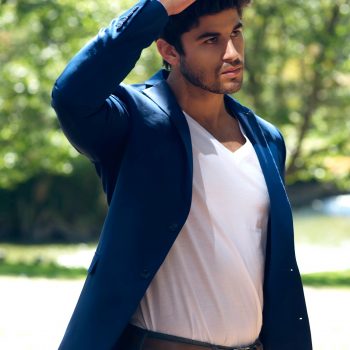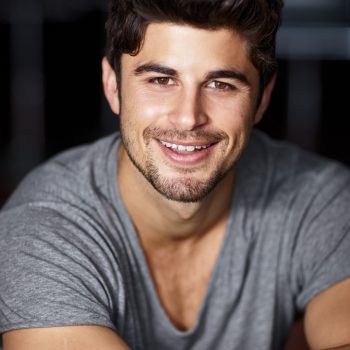Nick likes to share
2018 Interview from Authority Magazine
“Creative industries have no security, but I remind myself that there is actually no security in anything in life, so we may as well do what we love”, with Nick Bracks

Nick Bracks is an actor and mental health advocate from Australia.
Nick has spent the last decade working in the entertainment industry using his platform to educate people about mental health by speaking at more than 600 organizations in Australia.
Nick focuses on motivating and educating as many people as he can reach to improve their mental health.
Thank you so much for joining us! Let’s show everyone you’re a normal human being. What are your hobbies, favorite places to visit, pet peeves? Tell us about YOU when you’re not at the office.
“I love keeping fit and healthy, traveling and, when I am not doing that (or working), being lazy! My favorite way to relax is to lie around and watch movies or chat over coffee with friends. My favorite place to visit would have to be New York. I have been many times and have had some amazing experiences in that city. I hate waiting in lines and being stuck in traffic! That’s when I really need to use mindfulness.”
Can you tell us something about you that few people know?
“I find bleak weather very soothing.”
Do you have any exciting projects going on right now?
“Luckily, I do! I am about to roll out a new mental health initiative around Australia and New Zealand, and have an acting job lined up for later this year.”
Many people say success correlates with the people you meet in your life. Can you describe two that most impacted your success and why.
1. “My manager and close friend Craig McMahon: Craig took me under his wing and saw something in me (even when I didn’t) and helped me get over many many insecurities while teaching me about acting. He has become one of my closest friends and someone I learn from each day.
2. “My Uncle Bruce. I have always been ambitious and as a young kid my dream was to be a professional athlete. Bruce saw a part of himself in me and how eager I was (at the time to play AFL) and would spend 3–4 nights a week with me (outside of my other training) doing hours upon hours of drills and fitness work. He would also take me to games and support me in my later aspirations to be a middle distance runner. Bruce has been a constant inspiration and a large part of my ambition in acting is to share it with him.”
Leaders always seem to find ways to overcome their weaknesses. Can you share one or two examples of how you work outside of your comfort zone to achieve success?
“I was extremely shy due to past mental health issues and insecurities. To overcome this, I had to do public speaking at university, in which I would almost pass out from fear of speaking in front of even a handful of people. Pushing myself taught me that we can bypass the stories we tell ourselves and still do what we want (it just comes with initial discomfort). The stories we tell ourselves are almost never true.
“Here are two examples of how I work outside of my comfort zone:
1. “Mindfulness techniques: I try to observe my thoughts and remind myself when my mind is telling me something irrational. Even if the thought brings about discomfort I will actively push against it as I know the desired outcome outweighs the pain of being out of my comfort zone.
2. “Daily routine: I exercise, meditate and take cold showers daily and it keeps me focused.”
The concept of mind over matter has been around for years. A contemporary description of this is having mental toughness. Can you give us an example (or two) of obstacles you’ve overcome by getting your mind in the right place (some might call this reframing the situation)?
“I have had to use ‘mind over matter’ continually in the work that I do. When I first got into acting I would face people daily saying, ‘Nick there is no security’, ‘you will have no future’, ‘it is too hard’, ‘you can’t get into this, you are up against people who have done it their whole life’ etc.
“I still face this on a daily basis. I have had to develop self-love and self-belief and learn to not need validation from others, so I can stick at what is most important to me. I have faced the same in the mental health work and have had people continually telling me I won’t succeed and should get a secure job. The funny thing is that when the success does come, the people who put you down are the first to tell you how great it is that you achieved it.
“The main lesson I have learned is that we cannot get too attached to anything in life, highs or lows. We need to find that daily peace of mind and just live but our strongest values.”

What are your “3 Lessons I Learned from My Most Memorable Failure”
“I fail at things daily, but I do not see it as failure; I see it as learning. Failing is the best thing that can happen as it is the only way we can learn. We should embrace failure as fearing it will prevent us from putting ourselves on the line.
“My three most important learnings:
1. “To lose the ego,
2. “Stop caring what others think, and
3. “Do not be attached to the end result.
What unfiltered advice can you give aspiring stars regarding how to avoid common mis-fires in starting their career?
“It will take five times longer and be 10 times harder than you think! Don’t expect instant results and do not do it for the wrong reasons. If you are motivated by fame or money there are easier avenues and you are unlikely to last.
“Follow a dream that is personal to you, live by your own values and don’t measure your success based on others’ opinions.”
What is the best lesson you learned from your worst boss?
“I have worked for ego-maniacs who have more money than they know what to do with yet no self-awareness, and they seem unhappy. I learned that money is not the solution. Don’t look for external things to validate you — do the work on yourself first and the rest will flow.”
What is one “efficiency hack” you use consistently in your life to keep your time and mind free to focus on your strengths and passions?
“I meditate twice a day: 20 minutes in the morning and 20 minutes in the afternoon. It clears my mind, helps me refocus and keeps me on track.”
All actors or musicians have sleepless nights. We have a term we use with our clients called the “2 a.m. moment.” It’s when you’re wide awake and thinking not-so-positive thoughts about your business choices and future. Can you describe a 2 a.m. moment (or moments) you’ve had and how you overcame the challenges?
“I think we all have this and not only at 2 a.m.!
“Creative industries have no security, but I remind myself that there is actually no security in anything in life, so we may as well do what we love! I love what Jim Carrey said: ‘You can fail at what you don’t want so you may as well take a chance on what you love’.
What’s on the drawing board for your next venture?
“I am trying to continue building my own platform by using media content creation and public speaking to change the face of mental health. In addition, I am growing in acting and want to continue landing roles and further using that platform for the mental health advocacy.”
What did we miss? Feel free to share any other thoughts or advice on overcoming failure, initiatives you’re currently supporting, any other relevant information you would like to share with the readers.
“I feel very strongly about learning as much as possible about yourself, so you can go out into the world and do what makes you happy. We are taught to conform and not think for ourselves and that can have negative long-term consequences.
“I encourage people to take the harder road, follow their gut and face fears head on. It is the only way we can properly move forward.”

You can check out the interview here: https://medium.com/authority-magazine/creative-industries-have-no-security-but-i-remind-myself-that-there-is-actually-no-security-in-a6db14ea071f
